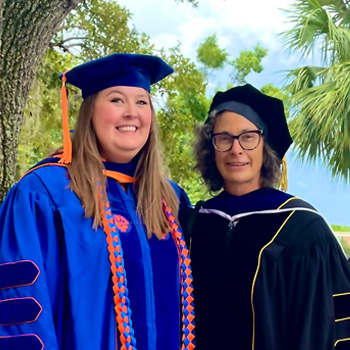
Dr. Alicia Boyd, a Ph.D. student in the Seaver Lab, successfully defended her dissertation on July 7, 2025. Her dissertation, entitled “Investigating the Ontogenetic Variation of Regenerative Ability in the Annelid Capitella teleta,“ explored animal regeneration and how regeneration abilities change through the life cycle. Alicia’s study utilized the segmented worm Capitella teleta, an animal whose juvenile and adult stages can regenerate multiple organs following transection. Most previous studies that evaluate the regeneration potential in different animals focus on adult stages. Instead, Alicia wanted to investigate whether early stages of the life cycle can replace lost body parts following injury, specifically focusing on the larvae of Capitella. Alicia developed a new cutting instrument and successfully amputated actively swimming larvae, each approximately the size of a grain of sand. She then characterized the cellular and molecular responses to amputation and found that larvae successfully healed the wound and initiated a regeneration response but were unable to completely replace lost structures. In a follow up set of experiments, Alicia repeated the same larval amputations and then induced these animals to undergo metamorphosis into juvenile worms and allowed them to grow for 2 weeks before analyzing them for their regeneration response. In these experimental conditions, the animals successfully regenerated and completely replaced all body parts lost by amputation. These results are notable because the stimulus for regeneration (amputation) is temporally dissociated from the response (regeneration). Alicia’s work provides insight into the increased capacity to regenerate following metamorphic cues.
Outside of her research efforts, Alicia has been very active in the Whitney community, serving as Vice President and President of the Whitney Graduate Student Association, running the Whitney internal research seminar series (JCDC), initiating and organizing a seminar series for trainees to highlight STEM careers outside of academia, and teaching in the high school and adult education programs. Alicia is looking forward to an international adventure as the next step in her professional journey and will be moving to Exeter, England, with plans to continue research on regeneration in annelids. Congratulations Alicia!